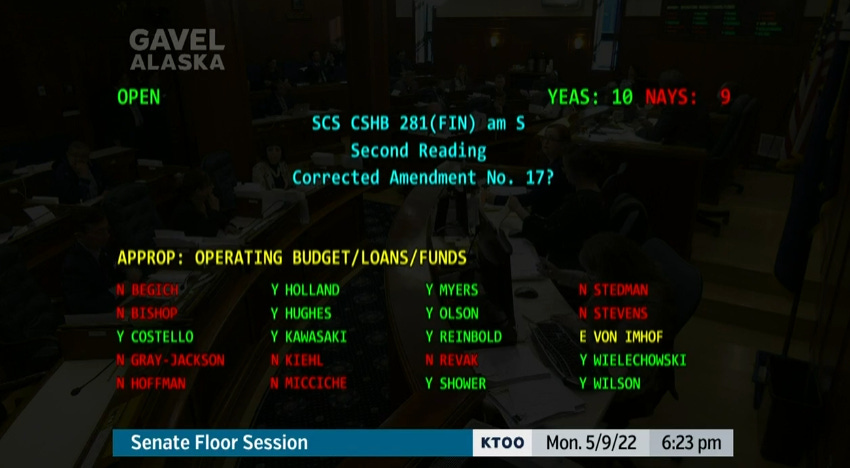Senate approves $5,500 payout in spending spree
They couldn't muster the votes for cuts but did have the votes for diving boards.
Good morning, Alaska!
In this edition: The budget process finally got underway in the Senate on Monday where we saw all the rhetoric and messaging about how Alaska is finally flush with cash again put into action with legislators approving a combined cash payout to Alaskans of $5,500, ignoring the warnings that oil prices won’t always be high and federal funds won’t always be sloshing around, effectively wiping out any hopes that this year’s windfall can be saved or put toward K-12 education in the future. Of course, there’s still the process with the House where this could be sent into negotiations and brought down but that’s far from a sure-fire bet. We also got a look at what some of those “fiscal conservatives” who’ve been ride-or-die on the PFD think should be next when it comes to balancing the budget: Piecemeal cuts targeting food stamp programs for seniors, vocational education, K-12 education and rural subsistence programs. For today, those failed and, instead, those “fiscal conservatives” approved nearly $600,000 more for diving boards in Anchorage-area schools, which feels unintentionally poetic.
Spice level: 🤑
Legislative day: 113
Senate approves $5,500 payout in spending spree
We’ve heard the refrain all throughout session: We’ve got the money this year!
A combination of high investment returns driven by the pandemic and a windfall of oil tax revenue due to the war Russia is waging against Ukraine has seen the projections for the state’s coffers swell to levels that we haven’t seen in nearly a decade. With that has come a push—particularly from the diehard pro-PFD crowd—to spend big on the dividends that they’ve built their political careers on. Never mind the warnings that oil prices and investments are notoriously volatile and a wrong turn on either would erase the state’s surplus and whatever buffer is remaining.
That’s all to say, the Senate’s operating budget started out on Monday with projections that it’d send hundreds of millions of dollars into savings and sock away money to forward fund K-12 education. By the end of the day, all those savings and goodwill to the next year of public education were essentially gone, wiped out to pay for a by-the-law $4,200 PFD as well as a $1,300 energy rebate bringing the expected total payout heading into this year’s elections to a whopping $5,500.
Sen. Mike Shower, R-Wasilla, carried the amendment for the larger dividend—upping the dividend from the $2,600 figure it already sat at—arguing that the higher number would give the Senate negotiating room with the House. He and others argued that Alaskans need the money now more than ever, arguing that direct cash payouts are the most effective way to boost the economy. The overarching theme, however, is that the state is flush in cash with no end in sight. When critics pointed out that the House could concur with the changes and lock the state into the spending, Shower replied “So what?”
Sen. Bert Stedman, R-Sitka, argued in favor of a more conservative approach to the budget, arguing that the state could pay out a $2,600 dividend—far larger than in recent years—while also putting away money into savings and towards education. He warned that the budget the Senate was settling on balanced only if oil stayed north of $101 a barrel for the upcoming fiscal year with little recourse if things go wrong.
“It appears that the net position of this amendment (to pay the $4,200 PFD) would leave roughly $700 million in the statutory budget reserve at $101 barrel oil. That’s about a maybe a $7 change in oil, $6 change in oil and we have no margin of error, nothing. It’s zero. We have no backfill language, we have no ability to access the constitutional budget reserve,” he said. “It removes virtually all the liquidity that we have and, again, that’s on $101 barrel of oil. We can’t sustain this.”
Sen. Tom Begich, D-Anchorage, said that while he supported the dividend, he couldn’t support it at the expense of education and the state’s future.
“Any thought that we were going to be forward funding education is going to be gone because we wiped out that resource. It’s really saying, ‘We’ve got the money today, let’s spend it down,’” he said. “Just because we have the money on the table doesn’t mean we have to spend it.”
As if to make a point that he was still a fiscal conservative, Sen. Shower followed up his amendment to pay out a full PFD with several piecemeal amendments that would have cut $500,000 here and a million dollars there. Not only were his proposed cuts laughably small compared to the enormity of the dividend payout but their targets were telling. His amendments would have cut a program to maximize senior food stamps, cut funding for a vocational training center, erased funding to make the health care account for longshoremen—the folks who tie up state ferries—whole after a dismal couple years of the pandemic and eliminated state funding for fisheries studies in the Bristol Bay region. For the most part, Shower aimed his cuts at people and groups outside of his region. Cuts for you, not for me. His biggest cut would’ve eliminated $60 million in supplemental K-12 funding that’s serving as a backstop in case separate legislation to raise the funding formula for the first time in years fails to make it to the finish line. Another would have eliminated forward funding for K-12.
“Public safety is important to all of us when something happens,” Shower said, “education is important to individuals that have kids. A lot of people don’t have kids.”
On the other side of the spectrum, Sen. Bill Wielechowski—an Anchorage Democrat who’s been a diehard supporter of the dividend, including bringing a case to the Alaska Supreme Court over it—pledged that the larger dividend could simply be taken care of by eliminating the oil tax credit payments and revising the state’s oil tax structure through separate legislation.
His amendment to eliminate $60 million of oil tax credits also failed without debate.
Instead, the Senate only seemed to have eyes for additional spending after approving the dividend and energy rebate. Despite Shower’s claim that cuts would be easy, most of his colleagues who supported the dividend pushed amendments calling for additional spending. Sen. Mia Costello ran several amendments attempting to bring home money for community projects, all of which failed. The Legislature did, however, have the votes to approve nearly $600,000 to replace diving boards at Anchorage-area high schools, arguing that everyone could use them. Shower, who said the state should be cutting back now that it’s paying out the dividend, supported the diving board amendment.
The Senate is set to continue on the budget today, which is expected to include amendments to provide additional funding for the Port of Alaska in Anchorage and Port MacKenzie in the Mat-Su. Once the budget work is wrapped up, the budget will head to the House for a concurrence vote. If the House rejects the Senate version, the legislation will to a conference committee where the differences are hashed out.
Other notable amendments:
The Senate rejected an amendment for the state to take over Clean Water Act permitting under the 404 primacy. It was met with stout opposition, with opponents noting that the $5 million and 28 new employees was likely not even close enough to replacing the federal regulators, whose staff is 21 people higher than that proposal. The benefit was also unclear because the state would still be required to follow the federal permitting requirements for wastewater discharge, but some opponents noted it was all likely aimed at giving Pebble Mine another shot. It failed on an 11N-8Y vote.
They approved an amendment that would provide $1.5 million to the community of Selawik to keep their firefighting equipment warm during the winter. It’s a clear need after the community saw four people die in a house fire when the community’s equipment was frozen. It was approved without objection.
Funding for the Alaska Long Trail lives. There was an attempt to kill the project and funnel the money to Fairbanks for a new training center for law enforcement, which ultimately failed.
Follow the thread: The Senate begins budget amendments.
‘We ever really loved him anyway.’
That’s the vibe from a scathing social media post out of the Alaska Democratic Party, calling the party’s 2020 nominee for U.S. Senate a “proven loser” and “not a liberal.” This comes after Gross said he’d be willing to caucus with Republicans if elected.






Mike Shower, aggh. Does Mr. Shower have children, grand children or great grand children who may want to go to school. Cutting education funding seems odd since he is from the MatSu, the kid producing capitol of Alaska. I am Not in favor of the imprudent spending on big PFDs . l am hoping that the conference committee cuts the PFD significantly and puts the oil windfall into savings, education and fixing the Anchorage ports. Kathrin McCarthy